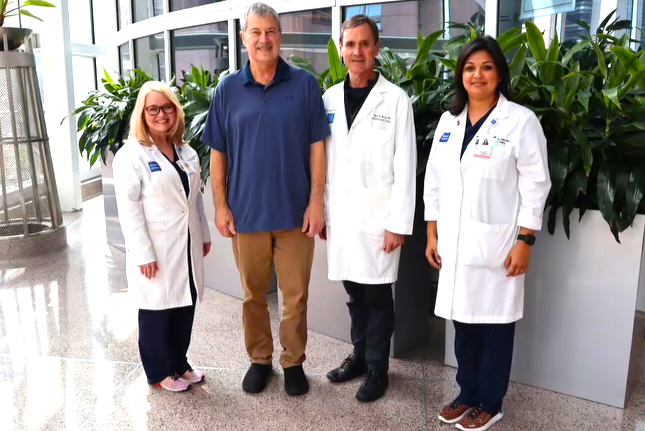Elton Youngblood felt an impending doom. The 66-year-old avid outdoorsman from Branson, Missouri, had difficulty walking 50 feet. His skin looked gray, and he had no energy. As an experienced physician’s assistant with the Veterans Health Administration, he recognized the symptoms of acute heart failure.
More than a decade ago, Youngblood’s aortic heart valve and ascending aorta were replaced. Because of his active lifestyle, he opted for a bioprosthetic valve made of cow heart tissue rather than a standard mechanical valve. While this would allow him to avoid blood thinners and their complex management, it meant the valve would wear out and likely need to be replaced in 10-15 years. Youngblood’s valve was nearing the end of its lifespan.
Then, in July 2023, Youngblood was diagnosed with alpha-gal syndrome, a food allergy associated with tick bites. Alpha-gal is a sugar found in the tissues of all mammals except humans and other primates. Youngblood immediately had to stop eating red meat – beef, pork and lamb ‒ and was allergic to other products from mammals, including some medications and medical products.
“It is the most challenging allergy because you have to read every label to avoid a reaction,” said Youngblood, who also must avoid dairy products. “It is the most limiting thing I've ever experienced in my life.”
People with alpha-gal experience a delayed allergic reaction that starts in a few hours. For Youngblood, he would get hives or suffer stomach pain and diarrhea. Others could experience nausea and vomiting. In some cases, people have an instant life-threatening anaphylactic reaction that requires immediate medical attention.
Youngblood knew his bioprosthetic aortic valve was deteriorating and surgery was inevitable. He spent the fall of 2023 contacting five leading cardiac hospitals in the United States about cardiac surgery and alpha-gal precautions. He was surprised that only Baylor St. Luke’s Medical Center in Houston was open to developing guidelines for cardiac surgery with strict alpha-gal precautions.
Dr. Marc Moon, chief of Adult Cardiac Surgery at Baylor St. Luke’s, and his team’s willingness to create a personalized approach to his complex cardiac care provided comfort and reassurance to Youngblood and his family.
“Mammal products are in many medications used during surgery, and it was going to be a high-risk surgery,” said Youngblood. “My interactions with the Baylor Cardiology Clinic were top quality.”
He called Baylor because Moon, the surgeon who performed his earlier heart valve replacement, had moved from Missouri to Baylor St. Luke’s in Houston in February 2022.
When Youngblood’s condition worsened after he got COVID in January 2024 and was hospitalized with secondary pneumonia, he needed to have the surgery sooner rather than later. He called Brittany Rhoades, PhD, a clinical nurse specialist at Baylor College of Medicine who works with Moon, and she assured Youngblood the team at Baylor St. Luke’s would be ready when he arrived.
“Mr. Youngblood’s alpha-gal allergy presented a very unique challenge,” said Rhoades. “We quickly identified a robust multidisciplinary team which included cardiothoracic surgery, anesthesiology, cardiology, allergy and immunology, internal medicine, nursing, dietary, pharmacy, and hospital leadership to ensure that all aspects of care were addressed. It was the tremendous work of this team that made certain that Mr. Youngblood’s surgery and hospitalization were successful.”
In a prior hospitalization outside of Baylor St. Luke’s, Youngblood developed a severe allergic reaction due to cross contamination after one of his meals was cooked on the same grill that was used to cook a hamburger.
“I had a reaction three to four hours later. My nose started running. I had swelling in my throat. They had to give me a big dose of steroids to kind of get me through that,” he said. “Little things like that will basically kill you, and somebody’s got to pay attention to that and make sure it doesn’t happen. And that’s what Baylor did.”
Due to limited information regarding alpha-gal syndrome and cardiac surgery, Moon contacted Dr. Scott Commins, a leading expert in alpha-gal at the University of North Carolina Medical School. Replacing the heart valve would require the use of the heart-lung machine and a blood-thinner called heparin. Heparin is extracted from animals and poses the threat of an allergic reaction.
“He provided advice regarding measures to decrease the inflammatory response,” said Moon. “So, we brought Mr. Youngblood in and treated him with steroids to decrease inflammation and antihistamines to decrease the allergic reaction. We treated him for two days prior to surgery and then were able to give him heparin during the surgery without any reactions.”
The physicians also discussed which type of replacement heart valve to use. Youngblood wasn’t an ideal candidate for a mechanical valve because it would require him to take a blood thinner, which is made from animals. They felt a cow bioprosthetic valve would provide the best results for Youngblood, both surgically and from a quality-of-life perspective, although there is not a lot of information regarding how long it will last in individuals with alpha-gal syndrome.
“We put it in and he did very well,” Moon said.
“The success of this very unique clinical case is a testament to the excellent surgeons and physicians at Baylor College of Medicine in conjunction with the nurses, multidisciplinary team and leadership at Baylor St. Luke’s,” said Rhoades. It was a very heartwarming demonstration of the most innovative and collaborative care in the world.”
Youngblood feels he received the very best medical care. “I’m here today, but it was all because of all the things that they put in place to get me through the procedure,” he said.




